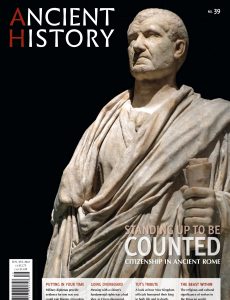
Ancient History Magazine – June-July 2022
English | 61 pages | pdf | 74.84 MB
EDITORIAL – CIVIS ROMANUS SUM! RIGHTS, RESPONSIBILITIES, AND BELONGING
What does it mean to be a citizen? What does it mean to ‘belong’ to a certain place or culture? When we think of citizenship today, many of us consider ourselves ‘global citizens’, i.e., we may hold more than one passport, thanks to our parents we may have more than one national identity, we may feel perfectly normal having divided loyalties, we may speak several languages, and we may even call more than one place on this planet ‘home’. I am definitely someone who falls into this category. I hold two passports; I was born in one country, raised in another, and after nine years I call England – my adoptive country – home. I can speak three languages and understand five.
And there are also no barriers to me obtaining citizenship based on my gender. I am a child of this new global identity. But this modern view of citizenship wasn’t always the case.
Citizenship meant something different to the ancient Romans – it wasn’t ‘global’ in the sense that we are accustomed to, and it was certainly not open to everyone (i.e., women, children, foreigners, etc), especially in its earliest days. So what did citizenship look like in the Roman Empire? Who could proudly proclaim, “Civis Romanus Sum!”? What protections did the state provide its citizenry, and, in return, what responsibilities did that entail for the citizen? In this issue, we explore what it meant to claim membership in this rather exclusive and prestigious ‘club’.
Download from:
